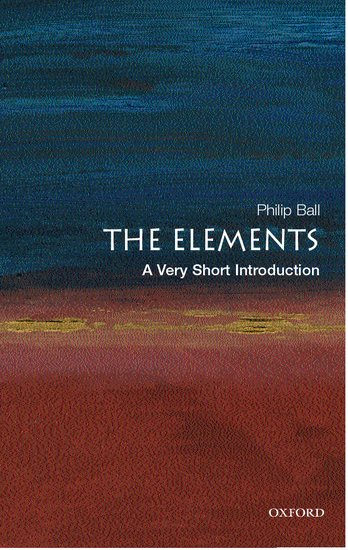Home >
A Very Short Introduction >
The Elements (Science)
A Very Short Introduction | Science
The Elements
ISBN: 9780192840998
Series: A Very Short Introduction
The Elements (Science)
A Very Short Introduction The Elements (Science) Media > Books > Non-Fiction > Education Books Expect Delays of Up to 4 Weeks| Order Below |
ISBN
9780192840998 (10-digit ISBN: 0192840991)
- Description
- Key Features
- Series Description
- Table of Contents
- A delight of a book.... Elegantly written...it's far-reaching, entertaining and salted with anecdote.... It could become a classic. Hold on to your first edition.' Roy Herbert, New Scientist.
- An engaging chronology of the elements, from the Greek philosophers who thought the world was made only from earth, air, fire, and water, to the work of twentieth-century radiochemistry in extending the Periodic Table.
- An exciting and non-traditional approach to understanding the terminology, properties, and classification of chemical elements.
- Includes chapters on particular elements (gold, iron, oxygen, etc), showing how they shaped culture and technology.
- Philip Ball is a high-profile science writer, who writes science extremely well for non-scientists.
This Very Short Introduction traces the history and cultural impact of the elements on humankind, and examines why people have long sought to identify the substances around them. Looking beyond the Periodic Table, the author examines our relationship with matter, from the uncomplicated vision of the Greek philosophers, who believed there were four elements - earth, air, fire, and water - to the work of modern-day scientists in creating elements such as hassium and meitnerium. Packed with anecdotes, The Elementsis a highly engaging and entertaining exploration of the fundamental question: what is the world made from?
Oxford's Very Short Introductions series offers concise and original introductions to a wide range of subjects--from Islam to Sociology, Politics to Classics, Literary Theory to History, and Archaeology to the Bible.
Not simply a textbook of definitions, each volume in this series provides trenchant and provocative--yet always balanced and complete--discussions of the central issues in a given discipline or field. Every Very Short Introduction gives a readable evolution of the subject in question, demonstrating how the subject has developed and how it has influenced society. Eventually, the series will encompass every major academic discipline, offering all students an accessible and abundant reference library.
Whatever the area of study that one deems important or appealing, whatever the topic that fascinates the general reader, the Very Short Introductions series has a handy and affordable guide that will likely prove indispensable.
Please note: As this series is not ELT material, these titles are not subject to discount.
1: Aristotle's Quartet: The elements in antiquity
2: Revolution: How oxygen changed the world
3: Gold: The most desirable element
4: The Eightfold Path: Organizing the elements
5: The Atom Factories: Making new elements
6: The Chemical Brothers: Why isotopes are useful
7: For All Practical Purposes: Technologies of the elements
End notes
Futher reading
This Very Short Introduction traces the history and cultural impact of the elements on humankind, and examines why people have long sought to identify the substances around them. Looking beyond the Periodic Table, the author examines our relationship with matter, from the uncomplicated vision of the Greek philosophers, who believed there were four elements - earth, air, fire, and water - to the work of modern-day scientists in creating elements such as hassium and meitnerium. Packed with anecdotes, The Elementsis a highly engaging and entertaining exploration of the fundamental question: what is the world made from?
Key Features
- A delight of a book.... Elegantly written...it's far-reaching, entertaining and salted with anecdote.... It could become a classic. Hold on to your first edition.' Roy Herbert, New Scientist.
- An engaging chronology of the elements, from the Greek philosophers who thought the world was made only from earth, air, fire, and water, to the work of twentieth-century radiochemistry in extending the Periodic Table.
- An exciting and non-traditional approach to understanding the terminology, properties, and classification of chemical elements.
- Includes chapters on particular elements (gold, iron, oxygen, etc), showing how they shaped culture and technology.
- Philip Ball is a high-profile science writer, who writes science extremely well for non-scientists.
Series Description
Oxford's Very Short Introductions series offers concise and original introductions to a wide range of subjects--from Islam to Sociology, Politics to Classics, Literary Theory to History, and Archaeology to the Bible.
Not simply a textbook of definitions, each volume in this series provides trenchant and provocative--yet always balanced and complete--discussions of the central issues in a given discipline or field. Every Very Short Introduction gives a readable evolution of the subject in question, demonstrating how the subject has developed and how it has influenced society. Eventually, the series will encompass every major academic discipline, offering all students an accessible and abundant reference library.
Whatever the area of study that one deems important or appealing, whatever the topic that fascinates the general reader, the Very Short Introductions series has a handy and affordable guide that will likely prove indispensable.
Please note: As this series is not ELT material, these titles are not subject to discount.
EASY ORDER FORM
PRICES LISTED INCLUDE CONSUMPTION TAX
Price Before Tax:
¥1,790


